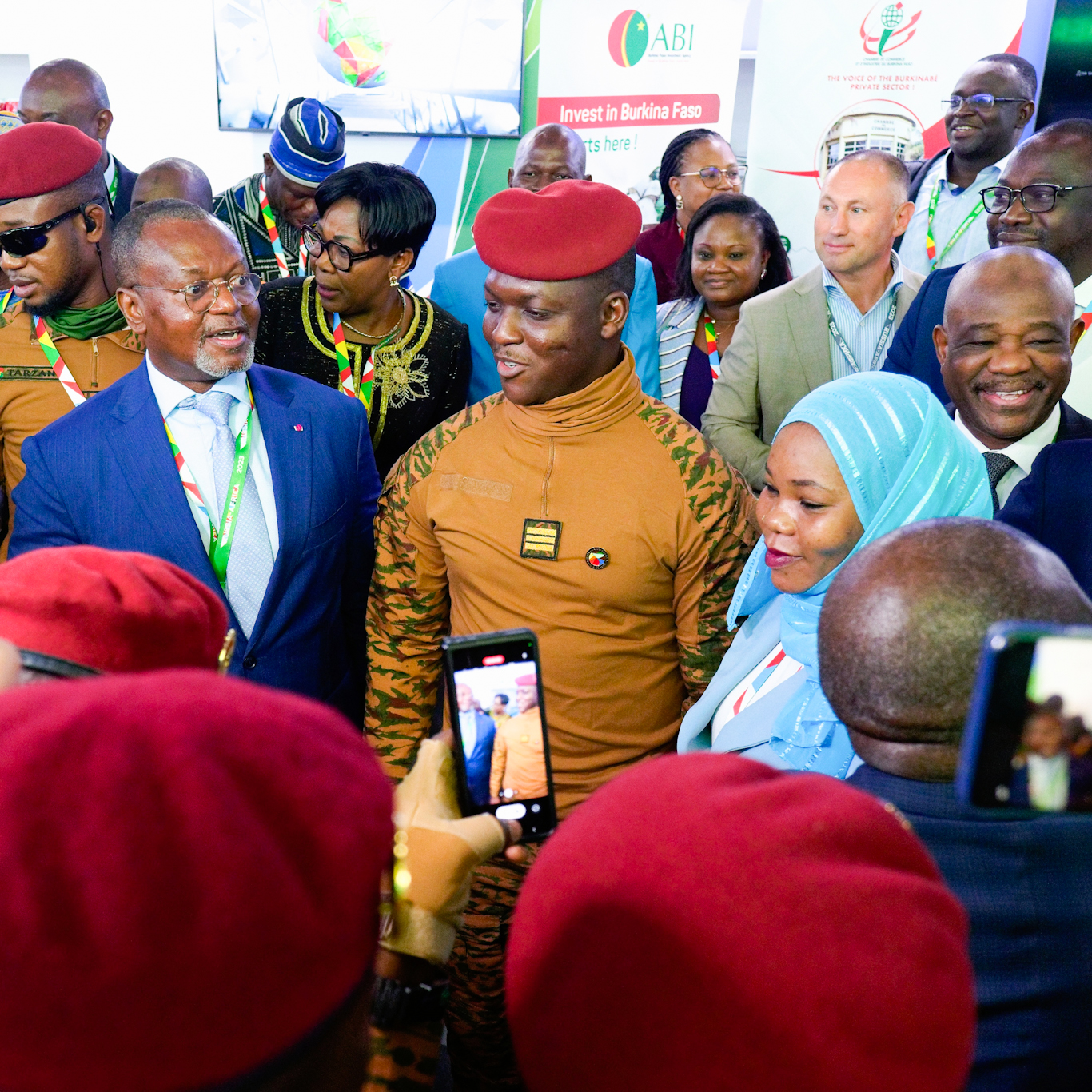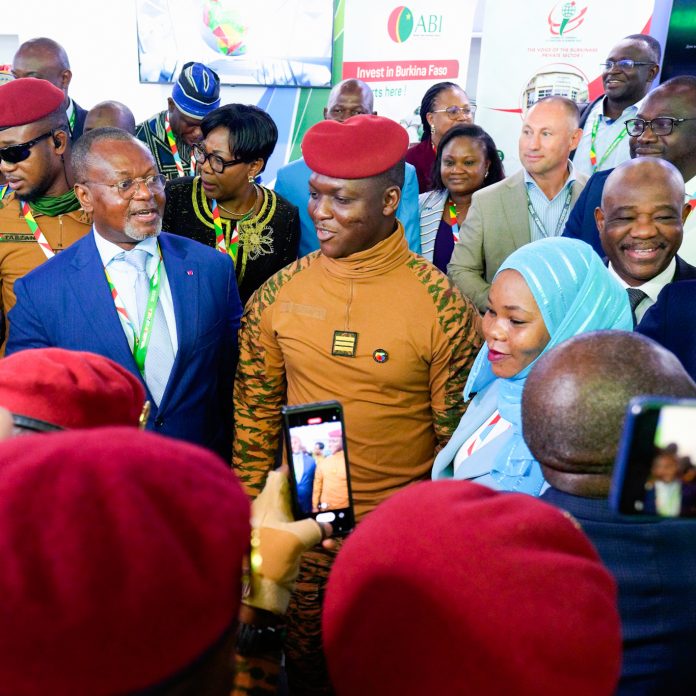Burkina Faso’s Ibrahim Traoré is remaking his nation, and in the process, making enemies in the West. Since taking power in 2022, the young military leader has expelled French troops, ejected Western corporations, and aligned his country with Russia, Cuba, and Venezuela.
Promoting pan-African unity and national self-reliance while surviving coup attempts, Traoré is positioning himself as a radical anti-imperialist and has drawn fire from Washington and Paris. MintPress News explores the project underway in Ouagadougou and the global forces trying to stop it.
Traoré in the Crosshairs
According to government statements, Traoré narrowly survived a foreign-orchestrated coup attempt last month. Security Minister Mahamadou Sana said that the military junta foiled a “major plot” to storm the presidential palace on April 16. The plotters, he said, were based in Ivory Coast, a Washington-backed neighbor where American military presence has recently expanded.Ever since he took power in a military coup in September 2022, Traoré has been drawing criticism from Western governments, not least the United States.
On April 3, General Michael Langley, commander of U.S. Africa Command (AFRICOM), spoke before the Senate, accusing the Burkinabe leader of corruption and helping Russia and China establish an imperial foothold in Africa. AFRICOM, the Pentagon’s regional command for Africa, coordinates U.S. military operations, intelligence gathering, and security partnerships across the continent, often framed as counterterrorism operations.
On the day of the coup, the U.S. Embassy changed its travel guidelines for Burkina Faso to “do not travel.” Langley reportedly met with Ivorian Defense Minister Téné Birahima Ouattara numerous times this year, both before and after the coup.
Since coming to power, Traoré has been systematically limiting the influence of Western powers in his country, calling it a matter of national sovereignty. In January 2023, he expelled the French ambassador, calling the country an “imperialist state.”
One month later, he ordered French troops to leave Burkina Faso. This helped spark a wave of other West African nations formerly part of the French empire to do the same. Today, Mali, Chad, Senegal, Niger, and Ivory Coast have expelled French forces from their lands. President Emmanuel Macron responded by accusing Burkina Faso and others of “ingratitude,” adding that these nations “forgot to thank” France.

Traoré’s administration has also blocked or expelled numerous Western government-sponsored media outlets, labeling them as agents of neocolonialism. Radio France International and France 24 were first. Then followed Voice of America, Britain’s BBC, and Germany’s Deutsche Welle in 2024. These moves drew sharp criticism from Western organizations. Human Rights Watch, for example, accused the government of a “crackdown” on dissent.
Although formally independent for over half a century, France maintains significant control over its former African colonies. Fourteen nations use the CFA franc, an international currency set at a fixed rate against the French franc and now the euro. This means that importing from and exporting to France (and now Europe) is very cheap, but doing the same with the rest of the world is prohibitively expensive. France maintains a veto over the monetary policies of the CFA franc, leaving African states economically dependent on Paris.
Traoré has described the CFA franc as a mechanism that “maintains Africa in slavery,” and has announced his intention to create a new currency. Along with Mali and Niger, Burkina Faso has broken away from the Western-backed ECOWAS regional bloc and established the Alliance of Sahel States, a pan-African union of states that sees itself as the first step towards a unified, anti-imperialist Africa.
The Legacy of Sankara
This was the dream of the revolutionary Burkinabe leader, Thomas Sankara. Like Traoré, Sankara was a military officer who seized power in his early thirties. And in just four years, he introduced sweeping reforms to boost the nation’s productivity and minimize reliance on foreign aid. Stating that “he who feeds you controls you,” he promoted domestic, small-scale agriculture to produce nutritious, locally grown food.
While many of the region’s leaders embezzled public funds, Sankara’s socialist revolution built social housing and health centers and tackled mass illiteracy. A feminist, he outlawed forced marriages and female genital mutilation, and made a point of appointing large numbers of women to high positions of power.
Sankara was assassinated in 1987. It was only after Traoré came to power that his killer, former President Blaise Compaoré, was convicted in absentia. Compaoré lives in exile in Ivory Coast.
Traoré sees himself as a disciple of Sankara and his movement. Western commentators are split on whether he truly follows in the legendary leader’s footsteps. Some, such as Daniel Eizenga of the Africa Center for Strategic Studies (a Pentagon think tank), state that the comparisons end with the leader’s penchant for military fatigues and red berets. Others, such as The Economist magazine, lament that Traoré is the genuine article—a development that spells bad news for big business. But few can deny that he is extremely popular. Ghanaian President John Mahama, for instance, noted that Traoré attended his inauguration in January and received far more applause than anyone, including Mahama himself.
Many of Traoré’s initiatives are directly inspired by the Sankara era. The new military government has emphasized achieving food sovereignty. A new, $1 billion initiative has been launched to mechanize agriculture and increase the production of staple crops such as rice, maize, and potatoes.
Traoré has also made moves to nationalize the nation’s mining industry. Burkina Faso’s economy revolves around gold, with the precious metal accounting for over 80% of its exports. The country is the world’s 13th-largest producer of gold, making around 100 tons per year, equivalent to about $6 billion. Yet, because foreign corporations own and control production, the nation and its people see precious little benefit from the industry. Indeed, the annual Burkinabe GDP is only around $18 billion.
“Why does resource-rich Africa remain the poorest region of the world? The heads of African states should not behave like puppets in the hands of the imperialists,” Traoré said. In August, his government nationalized two key Western-owned gold mines, paying only $80 million, a fraction of the $300 million they reportedly sold for in 2023. In November, the administration announced the construction of the country’s first gold refinery.
A Nation At War
Burkina Faso remains a nation in crisis. The country—and indeed much of the Sahel region—is locked in a bitter battle with well-armed Islamist groups who rose to power and prominence after NATO’s 2011 intervention in Libya. Since then, Libya has become an exporter of extremism, destabilizing the region. It is estimated that up to 40% of the country is in the control of Al-Qaeda or Islamic State-affiliated forces. Over 1,000 people in Burkina Faso lost their lives to these groups in 2024.
It is for this reason that Traoré has justified postponing the elections he promised when he came to power – a decision that many have criticized. “[Elections are] not the priority; clearly, security is the priority,” he said. It remains to be seen whether the Burkinabe people will accept this decision.
Perhaps the most questionable action of the war occurred in 2023 in the village of Karma, where around 150 people were massacred. Although the massacre was strongly condemned by the government, rights groups such as Amnesty International have labeled them responsible for the killings.
While he has expelled French forces working on counterinsurgency, Traoré has welcomed in Russian military advisors. He is also flying to Moscow to attend Russia’s Victory Day Parade on May 9. Such actions have caused serious consternation in Washington and Brussels. However, with the U.S. military concentrating on China and Russia, and the French in a weaker position in West Africa than ever, it is unclear whether military intervention is an option. A coup attempt or assassination appears more likely.
Time will tell whether Traoré will leave as indelible a mark on Burkina Faso as his hero, Thomas Sankara. Many African leaders have come to power promising radical change, but have failed to deliver. Yet his message of pan-Africanism, anti-imperialism, and self-reliance is certainly striking a chord. Traoré is certainly talking the talk. Now he must walk the walk.
Feature photo | Illustration by MintPress News
Alan MacLeod is Senior Staff Writer for MintPress News. He completed his PhD in 2017 and has since authored two acclaimed books: Bad News From Venezuela: Twenty Years of Fake News and Misreporting and Propaganda in the Information Age: Still Manufacturing Consent, as well as a number of academic articles. He has also contributed to FAIR.org, The Guardian, Salon, The Grayzone, Jacobin Magazine, and Common Dreams. Follow Alan on Twitter for more of his work and commentary: @AlanRMacLeod.
The post Why Washington is Worried About Burkina Faso’s Young Revolutionary Leader appeared first on MintPress News.
